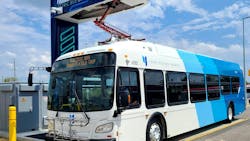CUTA’s annual ZEB Readiness and Procurement Survey shows growing readiness for Canadian public transit agencies to transition fleets to ZEBs
Canadian Urban Transit Association (CUTA) has revealed results of its annual ZEB Readiness and Procurement Survey. Each year, CUTA surveys transit agencies to gauge their readiness to incorporate zero-emission buses (ZEBs) into their fleets. CUTA says this year’s survey introduced new questions to better capture technical specifications and assess the impact of evolving policy factors, including U.S. tariffs.
According to the survey, there is growing readiness among Canadian transit systems to transition to ZEBs while also highlighting short-term shifts in procurement strategies. The survey notes that nationally reported readiness rose by about 15%, with every region outside Ontario describing higher confidence in their ability to move forward. Several agencies that were once only researching ZEBs have advanced to planning or early implementation stages.
The survey notes that procurement intentions reflect a more cautious approach. Battery-electric buses made up 66 percent of short-term (zero to three years) procurement plans in 2024 but only 42 percent in 2025. In the medium term (four to six years), the share also fell from 88% to 66%. At the same time, hybrid and diesel plans increased, particularly in Ontario and the Maritimes. In Ontario, diesel procurement in the four- to six-year range rose by 16%.
In the survey, CUTA says agencies cited the cost of infrastructure, challenges in working with utilities and local power limitations as reasons to be more cautious. CUTA notes that although many systems are investing in garage upgrades and charging facilities, regional approaches vary.
Survey respondents also identified where federal support would be most useful. Priorities included predictable, long-term funding commitments, assistance with infrastructure and utility coordination, and simplified funding application processes. Some agencies noted that evolving U.S. tariffs could also affect costs and procurement timelines, underscoring the influence of international policy on local planning.
CUTA says the findings point to a maturing conversation within the sector, as transit systems are moving beyond broad discussions of electrification and focusing instead on the technical and financial realities of implementation. The association notes the 2025 survey captures a sector in transition, balancing ambition with pragmatism, and while the path forward is not linear, the groundwork for wider ZEB adoption is firmly underway.
